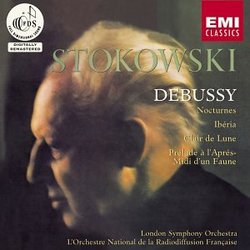| All Artists: Debussy, Lso, BBC Women's Chorus Sym, Stokowski Title: Nocturnes / Iberia / Prelude to Afternoon of Faun Members Wishing: 0 Total Copies: 1 Label: EMI Classics Release Date: 6/6/2000 Album Type: Original recording remastered Genre: Classical Styles: Historical Periods, Baroque (c.1600-1750), Modern, 20th, & 21st Century, Symphonies Number of Discs: 1 SwapaCD Credits: 1 UPCs: 724356731325, 724356731356 |
Search - Debussy, Lso, BBC Women's Chorus Sym :: Nocturnes / Iberia / Prelude to Afternoon of Faun
 | Debussy, Lso, BBC Women's Chorus Sym Nocturnes / Iberia / Prelude to Afternoon of Faun Genre: Classical
![header=[] body=[This CD is available to be requested as disc only.]](/images/attributes/disc.png?v=15401716) ![header=[] body=[This CD is unavailable to be requested with the disc and back insert at this time.]](/images/attributes/greyed_disc_back.png?v=15401716) ![header=[] body=[This CD is unavailable to be requested with the disc and front insert at this time.]](/images/attributes/greyed_disc_front.png?v=15401716) ![header=[] body=[This CD is unavailable to be requested with the disc, front and back inserts at this time.]](/images/attributes/greyed_disc_front_back.png?v=15401716) |
Larger Image |
CD Details |
CD ReviewsSublime Stokie! jdflynnno | 11/26/2000 (5 out of 5 stars) "When it comes to creating orchestral magic, there really was no else like Leopold Stokowski. With an orchestral master like Debussy, this is a match made in heaven. These old Capitol recordings from the late 1950s are a pure delight. Julius Baker's flute on "Prelude" is in a class by itself, and although I prefer Boulez's recent DG recording of "Nocturnes", Stokowski's performance is wonderful just the same with otherworldly BBC Women's Chorus singing in the third movement. The recording, naturally for Stokowski, is in excellent 1950s stereo and not a hiss is to be found. Stokowski's transcription of "Clair de Lune" is not too gooey, and "Iberia" has plenty of Spanish sizzle. Debussy fans might have their more favorite conductors, but Stokowski shows once again there were few pieces of music (Mahler, for example) he couldn't make his own. Anyone interested in Debussy and/or Stokowski should not hesitate." A great conductor and his vision of Debussy Santa Fe Listener | Santa Fe, NM USA | 06/27/2006 (5 out of 5 stars) "'Fantasia' made Stokowski a pop star, but it nearly ruined his serious reputation in the bargain. Born in 1882, he was already middle-aged when he gave up the Philadelphia Orchestra in 1938, and yet he had almost four decades to go, some of it glorious, a lot of it not. The low point of his reputation was probably in the Fifties when these incredible recordings were made. His vision of Debussy was dreamlike, while at the same time making every emotional gesture ripe and vivid. The New York pickup group that recorded Prelude to the Afternoon of a Faun features Julius Baker, first flute of the NY Phil., and no doubt the other wind soloists, all placed prominently close to the mike, were first desk men, too. Their ensemble is beautiful and nuanced as only the best musicians can deliver. Stokowski's approach is rich and voluptuous but with the right dash of dramatic tension. The Trois Nocturnes and Iberia come from sessions with the London Sym., and here Stokowski pulls his trick of reshaping the orchestra's sound to make it his own. The degree of control and hushed moodiness in Nuages is hypnotic--has this music ever sounded so enchanted? The raucous procession in Fetes explodes with color but remains mysterious, as befits night music. What stands out here, as everywhere on this CD, is Stokowski's ability to shape rhythms so that they feel utterly fresh and natural, no easy thing in Debussy's world of reticent artifice. The sirens in the third movement sing seductively, but Stokowski always remains aware that they are hidden by the cloak of night. The recorded sound is vivid and detailed, though not as close up as in the New York L'Apres midi. After those intoxicating Nocturnes--a rare compliment for a work that can seem chilly and aloof in ocncert--the world of Iberia is even more colorful. I don't know why Stokowski only conducted the middle section of Images pour orchestre. I do know I've never heard Debussy's Spain evoked with so much blood in its veins. This isn't Spain seen (and felt) through shimmering gauze, but a land of exciting passion. This is an ideal CD for anyone who finds Debussy too vaporous and impressionistic. The LSO winds are tangy and squawky, which makes the color palette even more earthy. In sum, a great recording in which every item goes to the top of the list." Very distinctive Debussy! R. J. Claster | Van Nuys, CA United States | 08/11/2002 (5 out of 5 stars) "The word that most readily comes to mind for me to describe these performances (in full bodied early stereo sound) is passionate. No detachment or distancing a la Boulez but instead, a very overt engagement with both the sensual aspects of the music, as in his performance of the Prelude to the Afternoon of a Faune, the Three Nocturnes and the slow movement of Iberia, and the fiery ones, as in the first and third movements of Iberia. Only Munch's Debussy has the same degree of overt emotionality, though with a more Berlioz like nervous intensity instead of the molten sensual flow of Stokowski. A definite recommendation for both Stokowski and Debussy lovers."
|

 Track Listings (8) - Disc #1
Track Listings (8) - Disc #1